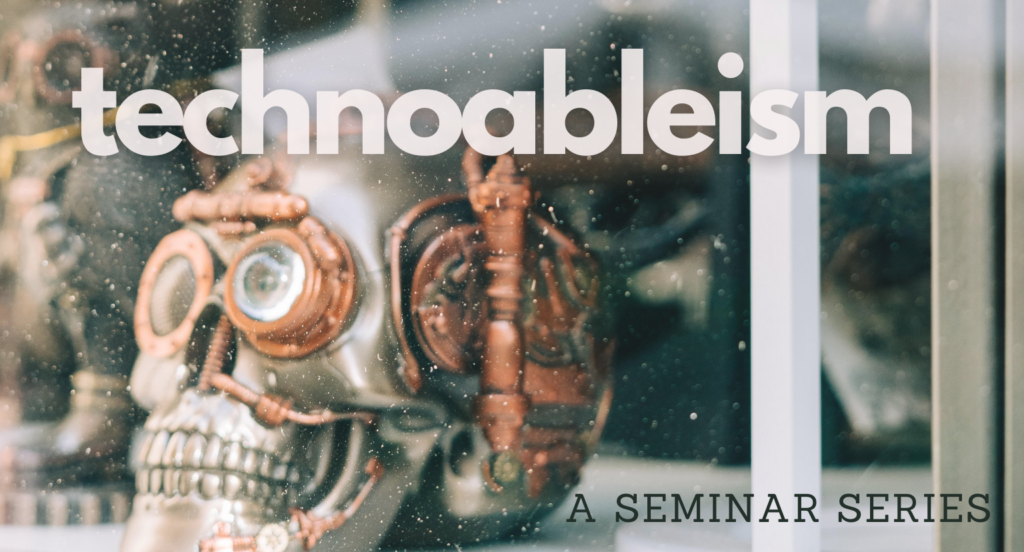Newsletter
The ITS Monthly Newsletter is circulated via email every month. The newsletter includes news, publications, events and other information related to The Institute for Technoscience and Society. To receive the monthly newsletter, sign up for our mailing list .
If you would like to submit a recent publication, event, or other news through our newsletter please complete the Request for information for the ITS Newsletter.
For previous or current newsletters please click on the relevant link below.
Events
"Data Enclaves" by Prof. Kean Birch
With discussant Prof. Koray Caliskan (The New School, New York)
Wednesday, 22nd May 2024 @ 10am-11am EDT
Come join us for the launch of Data Enclaves by Kean Birch, including discussant Prof. Koray Caliskan (The New School, New York).
This virtual event is taking place on 22 May 2024, from 10:00-11:00am EDT via Zoom: https://yorku.zoom.us/j/98121723369?pwd=blFsZGtxbzlhZWd6cEhIcVBiSDJ3Zz09
Prof. Kean Birch is Director of the Institute for Technoscience & Society, Professor in the Science and Technology Studies Graduate Program, and incoming Ontario Research Chair in Science Policy at York University, Canada.
Prof. Koray Caliskan is an Associate Professor of Strategic Design and Management at the Parsons School of Design, The New School, New York. He is author of Data Money: Inside Cryptocurrencies, Their Communities, Markets, and Blockchains (Columbia University Press, 2023) and Economization: Economies, Markets, and Platforms in Perspective, co-authored with Michel Callon and Donald MacKenzie (Columbia UP, forthcoming 2024).
Email daynaj@yorku.ca with any questions or concerns.

CBC News, CBC Radio, 630CHED (Global News) & two Globe & Mail Opinion Pieces
by Kean Birch, Director of the Institute for Technoscience & Society
Thursday, 22 March 2024 (update 6 April 2024)
630CHED (Global News) Radio (5 April): Is generative AI a waste of our time and money?
Globe & Mail (4 April): Generative artificial intelligence is simply a waste of our time and money.
Globe & Mail (21 March): Canada needs a sovereign wealth fund – built by monetizing our personal data
CBC News (21 March): Interview about US Department of Justice antitrust lawsuit against Apple Inc.
CBC Radio (21 March): Interview about US Department of Justice antitrust lawsuit against Apple Inc.

Globe & Mail Opinion Piece
by Kean Birch, Director of the Institute for Technoscience & Society
Netflix’s desperate crackdown on password sharing shows it might fail like Blockbuster
Wednesday, 15th February 2023
"Netflix is changing its subscription setup, testing it out in Canada and three other countries before, presumably, rolling it out across the United States, their more lucrative market. Described as a 'crackdown' on password sharing, this change will stop us accessing Netflix from devices not associated with our home network. It does make you think about whether it’s worth paying that subscription fee any more. There are also broader questions that this change raises. Most specifically, whether the business models and monetization strategies of digital firms like Netflix are viable in the long-run."
The Globe & Mail

In celebration of Black History Month
Building Black Worlds: Making Black Spaces in Digital Gaming Places
Tuesday, 27th February 2024 @ 1.00-2.30pm
CANCELLED (due to industrial action)
Join us for a talk by Dr. Akil Fletcher (Princeton University). In this talk, Dr. Fletcher will share his new work on Black intermediality, exploring how Black computer game players take existing game environments for their own use, going beyond the intentions of developers to create new social worlds of experience and being.
About the speaker: Dr. Akil Fletcher is an anthropologist who researches race and video games at Princeton University. His work lies on the boundaries of Anthropology, African American Studies, and Game Studies.

Nicholas Surber
Visiting Graduate Student, Institute for Technoscience & Society
PhD Researcher, Division of Science, Technology and Society, Chalmers University of Technology, Gothenburg, Sweden
Who’s who and where: Papers and patents in the evolving European nano-race
NEW DATE! Thursday, 28th September @ 3.00-4.00pm, 305 York Lanes, York University (in-person only)
Nanotechnology can be seen as an example of the ongoing economization of science and technology. Its development has even been characterized as a “nano-race” to a nano-enabled technoscientific future. Bibliometric studies show that the literature focuses on both nanotechnology’s internal (reflexive) and external (societal) consequences, having commenced in the 1990s with a predominant focus on the (positivist) technoscientific content. Using a bibliometric approach, I pivot from ‘content’ (questions of what) to normative issues surrounding justice and safety through two core research questions: who is developing nanotechnology recently in Europe and where (which countries) is this development taking place? These questions are addressed by enlisting multiple Espacenet and Scopus searches of nanotechnology patents and papers in the sample time period (2010-2018) to collect, clean, code, and analyze metadata from the most prolific patent applicants, publishing (paper) institutions, and funding organizations. Normative concerns are highlighted by comparing the four trajectories of (neutral) nanotechnology, the (moot) nanomaterial groups of carbon nanotubes and nano-silver, and with the (good) research area of nanosafety, in terms of individual entries, stakeholder groups and the affiliated European countries. Across these samples, the resulting distributions reveal substantial concentration, especially regarding funders, and significant repetition of applicants, institutions and funders. Instead of seeing precautionary reprioritization away from the moot nanomaterials, nanosafety institutions represent the most divergent inventory, suggesting that longstanding environmental concerns have not disrupted the place of these nanomaterials in the nanotechnology canon. The overarching question of who’s who in nanotechnology thus allows for an assessment not only of who benefits from its development, but of the prioritization of safer nanomaterials in the context of safe-and-sustainable-by-design and specifically regarding the European Chemicals Strategy for Sustainability (CSS).

Edemilson Paraná
Assistant Professor, Department of Social Sciences/Graduate Program in Sociology, Federal University of Ceará, Brazil.
Bitcoin as a digital commodity (with Tomás Rotta)
Tuesday, 14th March @ 2.00-3.30pm, 305 York Lanes, York University (in-person only)
In this talk, we argue that Bitcoin is not money but rather a digital commodity that has value but no value-added. We show that both the production of and the speculation with Bitcoin draw from the existing global pool of value-added. By extending the Classical Political Economy approach and the New Interpretation of the labour theory of value to the domain of digital commodities, we argue that Bitcoin mining is an automated reproduction process that requires no direct (living) labour and thus creates no new value. Bitcoin, in this regard, is not ‘digital gold’. Between sectors, Bitcoin mining redistributes wealth and value-added already in existence, while Bitcoin miners with more computational power compete to appropriate the mining profits within the blockchain. The Bitcoin blockchain then creates rivalry in both the ownership and the use of the digital commodity through non-legal means. Our approach can be further expanded to the larger domain of automated digital commodities that are reproducible without the expenditure of direct, living labour.

Franziska Cooiman
PhD Researcher, Weizenbaum Institute,Germany & Roskilde University, Denmark
Imprinting the economy: The structural power of venture capital
Tuesday, 6th December @ 2.00-3.30pm, 626 Kaneff Tower, York University (in-person only)
In this talk, I analytically link asset management and the digital economy by analyzing the structural power of venture capital (VC) investors.I propose the notion of imprinting, which describes how financial actors, enabled by the structural position, shape businesses according to their specific logic.Concretely, I argue that VCs’ logic is one of assetization, whereby VCs turn startups into assets for themselves and their capital providers. To do so, VCs seek hyper growth, selecting only companies with the potential to grow fast and large and decouple financial value from business fundamentals. Instead of the threat of exit, VCs establish direct and indirect channels of control: legally, via preferred shareholder rights, board seats, and payout conditionality; and as participatory capital, offering operational advice and access to their network.Through this approach,I aim to contribute to a nuanced understanding of financial sector power in contemporary capitalism.

ChatGPT: One Year Later, A Roundtable Discussion
Hybrid event: Zoom and In Person in the Lassonde Research Center (LRC) Room 102
Registration link HERE.
Directions to reach LRC102 will be provided upon registration
Thursday, 30 November 2023 @ 12.00-1:30pm
Convening on Nov 30, the one-year anniversary of ChatGPT’s launch, this roundtable brings together a diverse group of scholars to reflect on the promises and perils of generative AI in the context of higher education. Turning their eyes to the future, each of our panellists will bring forward a topic or concern they see as being underexplored, laying the groundwork for future conversations and collaborations as we continue to make our way
in this new educational landscape.
Dr. sava saheli singh
Assistant Professor of Digital Futures in Education

Dr. Kelly Bergstrom
Assistant Professor, Department of Communication & Media Studies

Ryan Collis
Doctoral Candidate, Graduate Program in Education


Seminar 3: Technoableism Seminar Series
Wednesday, 18 September 2024 @ 11:00-1:00pm
Join us for a talk by Michelle Friedner (University of Chicago) and Fulden Arisan (University of Chicago) with discussion by Michelle Charette (York University) & Gabi Schaffzin (York University). This is the final event in a three-part series about technoableism, organized by the ITS Technoscientific Bodies & Minds cluster.
About the speakers: Michelle Friedner is a medical anthropologist and professor at the University of Chicago researching how deaf and disabled people navigate complex social, political, and economic structures in urban regions of India, interested in how questions of stigma and value can be related. And Fulden Arisan is a PhD student in the Department of Comparative Human Development at the University of Chicago, whose research focuses on the trajectories of cochlear implant technology in Turkey. Fulden investigates the social and political entanglements of CI technology and its relation to emerging notions of subjectivity within the context of authoritarian populism.

Seminar 2: Technoableism Seminar Series
Monday, 15th January 2024 @ 3-5pm
REGISTRATION LINK HERE
Join us for a talk by Prof. Ashley Shew (Virginia Tech) with discussion by Jorge Antonio Vallejos (York University) & Emilia Nielson (York University). This is the second event in a three part series about technoableism, organized by the ITS Technoscientific Bodies & Minds cluster.
About the speaker: Ashley Shew is an Associate Professor at Virginia Tech, where her research focuses on philosophy of technology, disability and technology, and ethics and the body. She coined the term technoableism, explored in depth in her upcoming book Against Technoableism: Rethinking Who Needs Improvement.

Seminar 1: Technoableism Seminar Series
Wednesday, 25th October 2023 @ 3-5pm
ZOOM LINK HERE (Passcode: 369828)
The first talk in the Technoableism Seminar Series is by Professor Kelly Fritsch and Professor Anne McGuire, “Crip Maintenance / Maintaining Crip: On Making and Breaking with Disability”
Discussants will include Nicole Winchester & Professor Melanie Baljko.

Book Launch
Dr. Lee McGuigan's Selling the American People: Advertising, Optimization, and the Origins of Adtech (MIT Press, 2023)
Thursday, 14th September 2023 @ 6-8pm
The book launch will include a presentation by the author, followed by an interactive Q&A session with the audience. The event is in-person, free, and open to the public.
Algorithms, data extraction, digital marketers monetizing "eyeballs": these all seem like such recent features of our lives. And yet, Lee McGuigan tells us in this eye-opening book, digital advertising was well underway before the widespread use of the Internet. Explaining how marketers have brandished the tools of automation and management science to exploit new profit opportunities, Selling the American People traces data-driven surveillance all the way back to the 1950s, when the computerization of the advertising business began to blend science, technology, and calculative cultures in an ideology of optimization. With that ideology came adtech, a major infrastructure of digital capitalism.
To help make sense of today's attention merchants and choice architects, McGuigan explores a few key questions: How did technical experts working at the intersection of data processing and management sciences come to command the center of gravity in the advertising and media industries? How did their ambition to remake marketing through mathematical optimization shape and reflect developments in digital technology? In short, where did adtech come from, and how did data-driven marketing come to mediate the daily encounters of people, products, and public spheres? His answers show how the advertising industry's efforts to bend information technologies toward its dream of efficiency and rational management helped to make "surveillance capitalism" one of the defining experiences of public life.
Lee McGuigan is Assistant Professor in the Hussman School of Journalism and Media at the University of North Carolina, Chapel Hill, and an associate at Cornell Tech's Digital Life Initiative. He is a coeditor of The Audience Commodity in a Digital Age.
Organized by the Institute of Communication, Culture, Information and Technology (ICCIT) at University of Toronto Mississauga (UTM).
Cosponsored by the Canadian Communication Association (CCA), the Communication and Digital Media Studies Program (CDMS) at Ontario Tech University, and the Institute for Technoscience & Society (ITS) at York University.

